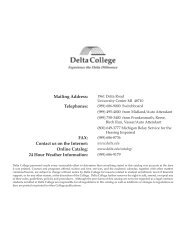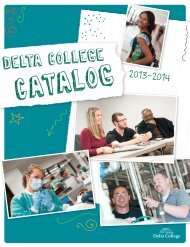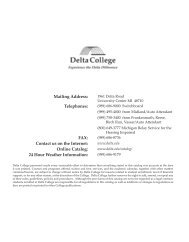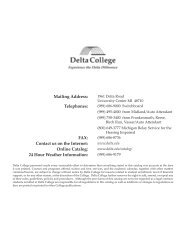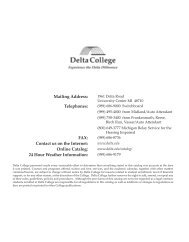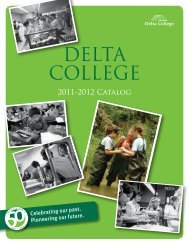2012 - 2013 catalog - Delta College
2012 - 2013 catalog - Delta College
2012 - 2013 catalog - Delta College
Create successful ePaper yourself
Turn your PDF publications into a flip-book with our unique Google optimized e-Paper software.
Definitions of <strong>College</strong> Terms<br />
Don’t get lost in <strong>College</strong> jargon. Understand these terms, which generally<br />
are common to all colleges, and your academic life will be easier.<br />
Academic Year: September through the following August. Includes the<br />
Fall Semester, Winter Semester, and Spring Semester,.<br />
Academic Credits: See Credits.<br />
Accredited: Certified by a specific state, regional, or national organization<br />
as meeting standards of quality in instruction, staffing, facilities,<br />
finances, and policies.<br />
Add: Changing your schedule by adding a course after your initial<br />
registration.<br />
Admission: Being accepted by <strong>Delta</strong> so you can register for courses.<br />
Assessment: Basic skills tests in English, reading, and math to assist you<br />
in selecting courses at the appropriate level. Generally, assessment is<br />
required for new students.<br />
Associate Degree: Degree (diploma) granted after successful completion<br />
of a program of study which has a minimum of 62 credits.<br />
Audit: Registering for and attending a course, but receiving no grade<br />
or credits. Regular tuition and fees must be paid. Audits do not count<br />
toward completion of a program or graduation.<br />
Caution: A warning status due to low grades.<br />
Centers: See maps, in this section.<br />
Certificate: Document granted upon successful completion of a program<br />
of study which has less than 62 credits.<br />
Concurrent Course: Often referred to as Corequisite. A course that<br />
must be taken during the same semester as another course is taken.<br />
Concurrent courses are listed at the beginning of the course description.<br />
See Section VI for Academic Course Descriptions.<br />
Contact Hours: The total hours of lecture and laboratory instruction<br />
required for each course.<br />
Corequisite: See Concurrent Course.<br />
Course: A single subject, such as ENG 111, taken for one semester.<br />
Credits: Also referred to as Academic Credits, Credit Hours, and<br />
Semester Hours. Each course is assigned a number of credits which<br />
generally indicates the number of hours per week the class meets; i.e.,<br />
a three credit course generally meets three hours each week. Courses<br />
with labs and occupational courses, however, generally meet more hours<br />
than the number of credits they carry. Tuition and fees are ordinarily<br />
charged by credit.<br />
Curriculum: See Program of Study.<br />
Drop: Changing your schedule by dropping a course after your initial<br />
registration.<br />
Dual Degree: An Associate degree that is earned by completing two<br />
specified curricula concurrently. Approved curricula combinations are<br />
listed in Section III, Programs, Dual Degrees.<br />
Elective: A course you may elect (choose) to take as opposed to a course<br />
you are required to take.<br />
Fees: Special charges for courses or services other than tuition.<br />
Financial Aid: Money received from various sources (grants, loans,<br />
scholarships, jobs) to help students with college costs. Most, but not<br />
all, forms of aid are based on financial need.<br />
Financial Aid Transcript: A document you are required by federal<br />
regulations to have every other college you attended send to the <strong>Delta</strong><br />
<strong>College</strong> Financial Aid Office, which lists any federal aid you may have<br />
received or states that you received no aid. Required of financial aid<br />
recipients before aid can be awarded.<br />
Freshman: Academic student who has earned 29 or fewer credits.<br />
Full-Time Student: Enrolled in 12 or more credits in a semester.<br />
G.E.D. (General Educational Development): A high school equivalency<br />
certificate for adults who did not receive the traditional high school<br />
diploma. It is earned by passing the national G.E.D. exam, which may<br />
be taken through <strong>Delta</strong>.<br />
General Education: A group of courses in the areas of social science,<br />
natural/physical science, communication, and humanities which provide<br />
a common and broadly-based body of knowledge.<br />
GPA (Grade Point Average): The GPA is determined by dividing the<br />
grade points earned (see definition of grade points) by the number of<br />
credits attempted, excluding courses in which you received final grades<br />
of “P,” “I,” “X,” “WI,” “W,” or “NC.” The semester GPA includes<br />
grades in each semester; the cumulative GPA includes grades from all<br />
semesters at <strong>Delta</strong>.<br />
Grade Dispute: The process available to you if you do not agree with<br />
the grade you received in a course. See Section IV, Academic Policies<br />
and Information, Disputed Final Grade Policy.<br />
Grade Ombudsman: The staff member who will provide you with<br />
information and assistance in understanding and following the Grade<br />
Dispute process. For name of person, contact Senate Office at 686-9297.<br />
Grade Points: Numerical values assigned to a letter grade for a course<br />
(“A”= 4 pts., “B”= 3 pts., “C”= 2 pts., “D”= 1 pt., “F”= 0 pts.), which are<br />
then multiplied by the number of credits assigned to the course; i.e.,<br />
a “B” grade for a three credit course would have three grade points x<br />
three credits = 9 grade points.<br />
Graduation Requirements: Specific steps you must successfully complete<br />
to qualify for a degree or certificate. See Section IV, Academic Policies<br />
& Information, Graduation Requirements for details.<br />
Grants: Money provided for educational expenses which does not have<br />
to be repaid; also called “gift aid.”<br />
In-District Student: A legal resident of Bay, Midland, or Saginaw county<br />
as defined by the <strong>Delta</strong> <strong>College</strong> residency policy.<br />
Instructor-Initiated Drop: Being dropped from your course by your<br />
instructor for either lack of attendance or lack of the required prerequisites.<br />
Loans: Money you borrow from your bank or credit union for educational<br />
expenses which must be repaid after you leave school.<br />
MACRAO: A transfer agreement between many Michigan two- and<br />
four-year colleges, which standardizes the basic general education<br />
requirements. See Section III, Programs for details.<br />
<strong>Delta</strong> <strong>College</strong> <strong>2012</strong>-<strong>2013</strong><br />
445



